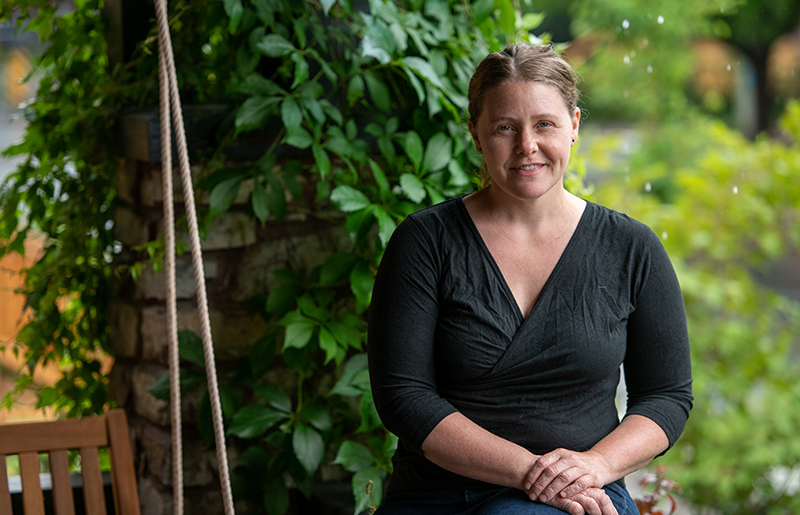Autistic adults help develop pathway to independent living
October 8, 2021
AT A GLANCE
- There are few suitable and affordable housing options for autistic adults in Canada
- For some adults on the spectrum, just understanding how the housing system works can be a barrier to finding a suitable home
- A team of advocates and experts with professional and, in some cases, lived experience, is working to change this
Note: Canadians on the autism spectrum have diverse opinions on language and how they wish to be referenced. For this story, we are following the recommendations of the self-advocate advisors for this Solutions Lab and will use identity first language (‘autistic adults’ or ‘adults on the spectrum’).

Adults on the autism spectrum are largely unheard in Canada’s housing system. As a result, there is little in the way of housing that is suitable and affordable. A team of advocates and experts with professional and, in some cases, lived experience, are working to change this. They are identifying the barriers autistic adults face and developing housing solutions for independent living.
Autism Ontario describes autism as a neurological ‘difference’ or ‘condition’ that affects the way a person communicates and relates to the world around them. It can affect body language, social interactions, relationships and sensory processing capacities. Being autistic means that your brain may process information differently than non-autistic people.
- 1 in 66 Canadian children and youth (ages 5-17) are diagnosed with Autism Spectrum Disorder (ASD). Autism Spectrum Disorder among Children and Youth in Canada 2018.
- 1 - 2% of the Canadian population is on the autism spectrum (approximately). Canadian Medical Association Journal
The barriers to suitable, affordable housing for autistics are as wide ranging as the capabilities and needs of people on the spectrum. Circumstances that are simple to navigate for non-autistic adults can be overwhelming and even traumatizing for those on the spectrum. Barriers can include everything from knowing what to look for in a suitable house to understanding leases and how to share space with others. Trends show that autistic adults are increasingly at risk for food and shelter insecurity and homelessness.

“Autism presents in different ways—people on the spectrum have different physical and sensory needs,” explains Fiona Wright, a social process facilitator with Lansdowne Consulting Group.
“So when it comes to housing for people on the spectrum, there is no one-size-fits-all solution. There is a big gap in who is successful in finding suitable housing and who is not.”
Developing a pathway to independent living
Fiona led the design of a Solutions Lab that launched in October 2020. Led by Lansdowne Consulting Group, the goal of the lab is to develop a pathway to independent and fulfilling living for autistic adults. The project was initiated by Fiona’s colleague, Pari Johnston, who has an autistic son. Like many parents, Pari is concerned about how she will support her son in adulthood. In most jurisdictions, supports for people on the spectrum end at age 18.
“Autistic adults are often left behind,” says Fiona. “If you struggle with employment and can’t get housing, you can end up traumatized. These challenges can also lead to mental health issues or boredom and restlessness on top of everything else. Bricks and mortar are only part of the solution and need to be matched with the right support. Part of the challenge is to determine the right mix of support and the right housing for all stages of life.”
Autistic adults are often left behind. If you struggle with employment and can’t get housing, you can end up traumatized.
The project’s advisory committee is comprised of academics, researchers, mental health experts, association members and people with lived experience. In total, 12 partner organizations are supporting the project.
Lansdowne Consulting also hired 3 people on the spectrum to be ‘self-advocate advisors.’ Their role is to ensure that their perspectives and experiences are included in the project (“nothing about us without us”). The self-advocates also helped mitigate the unconscious biases of non-autistic team members. They promoted the Solutions Lab within their networks and continue to participate actively in the project.
Given the COVID-19 pandemic and other constraints, the committee opted for a narrative research methodology. Narrative research is a form of qualitative research that typically focuses on the lives of individuals as told through their own stories. In this case, stories were gathered online from people with lived experience, their families and friends, and experts. A language-appropriate story-gathering tool was developed, with input from the self-advocates.

Building trust requires guidance, understanding and solutions
“People were excited at first but many were reluctant to put their experiences online,” says Helen Ries, a consultant on the project. “So there was a long period at the beginning where we had to build trust in the community.”
In fact, building relationships and trust proved to be a significant challenge for the project team. Misunderstandings arose as a result of different communication styles and expectations. These communication barriers occasionally led to friction, conflicts and loss of trust.
To address this problem, Lansdowne Consulting hired a facilitator. The facilitator offered guidance, understanding and solutions to both the self-advocates and the team leads when situations arose. This helped ensure that the advisory committee, self-advocates and project team were able to work together more effectively.
Affordability biggest barrier to suitable housing
Courtney Weaver is one of the project’s self-advocates. She has a full-time day job with Shared Services Canada and works a couple of evenings a week for a Member of Parliament. She also holds 2 degrees—a Bachelor of Arts in history from Queen's University and a Masters in Critical Disability Studies from York University.
“I am not as sensory-overwhelmed as some people on the spectrum and I have not experienced any real barriers to housing,” Courtney acknowledges. “But I’ve lived in a lot of different circumstances—university residence, with roommates during and after university and by myself. Getting involved in this project was an opportunity to learn more about the issue of autism and housing and to offer the lived experience I have.”
Despite not experiencing direct barriers to housing herself, Courtney knows that many autistic adults do. “There can be real horror stories when people leave their parents’ homes. Often, they aren’t taught the basic things to look for in a decent apartment. I’ve heard about people ending up in rubbish apartments or living with an abusive partner. But the biggest barrier is just plain affordability. There also needs to be a safety net for people on the spectrum who may suddenly be left with no supports due to the death of a parent or caregiver, for example.”

Accessibility magnifies housing challenges
Affordability and social supports are also a top-of-mind concern for Maddy Dever, another of the project’s self-advocates. Maddy identifies as non-binary and uses a walker after they were involved in a serious car accident last year. Four of their five children are on the autism spectrum. They have recently been told that their landlord is selling the house they live in, so the family needs to find a new home.
“Market rent is almost double what I’m paying now,” says Maddy. “It’s difficult to find a place, especially when you need accessible housing. When you put accessible and affordable together, the housing challenges are magnified. ODSP (Ontario Disability Support Program) is my main source of income, and I have to expose this on applications. I totally understand that landlords need to know you have a steady source of income but making this known does not provide a level playing field. So we get the least best places.”
Navigating the housing system can be traumatic
Maddy also notes that changing housing can be a traumatic experience for people on the spectrum. Even if everything else in your life is stable, things can fall apart quickly if you have to change housing.
“Just understanding how the system works can be a real barrier,” says Maddy. “There are supports for people with physical disabilities but not for people who are otherwise different. Autistics don’t fit the mold and trying to figure out housing and other supports is difficult.”
When you are in a crisis, housing tends to be part of it. Housing is the end piece of the domino and the one with the most barriers.
Knowing where to go for help can be a particular problem for autistics who are transitioning into adulthood and leaving the family home.
“If you need to start doing things without any experience, it is very difficult,” says Maddy. “Some teens and young adults are just not prepared for the nitty-gritty of life. How do you deal with a landlord? How do you navigate home insurance? What do you do if your sink drain plugs?”
“When parents let go,” Maddy adds, “young autistics often end up in difficult situations. A large portion of 17- to 30-year-olds on the spectrum end up in crisis.”
“When you are in a crisis, housing tends to be part of it. Housing is the end piece of the domino and the one with the most barriers.”
Advocating for others easier than self-advocacy
Maddy has also experienced the frustration of being able to help other people but not themselves. “I have been an advocate for autistics for years, but when it comes to self-advocacy, I can’t do it. It is overwhelming. I feel the weight of this every single day. I feel the weight of what my children will experience when they leave my home.”
Lansdowne Consulting Group closed the online story-collecting tool in March 2021, after gathering some 200 stories. This will give the project committee the data needed to start generating ideas that will lead to solutions.
The end game: more and better housing options are needed
“The end product will hopefully be a set of solutions that will be adopted so people have better experiences with housing,” says Fiona. “Personally, my goal is to create inclusive spaces for people who are on the spectrum.”
For her part, Courtney envisions both short- and long-term outcomes. “The immediate impact I’m hoping to see is that we get many more stakeholders interested and involved in what we are doing. They have the operational capacity and funding to keep the conversation about autism and housing going. In the longer term, I’m looking to see that more housing options, and information about them, are made available for people on the spectrum. I think this project has amazing potential.”
Maddy agrees. “I hope the lab clarifies and quantifies the different problems we face that need thoughtful consideration so we can start looking for solutions. There has been little research on adult autistics and our needs. I’m so glad we have this opportunity now.”
KEY FACTS
- Housing through an Autism Lens received funding from Solutions Lab, a National Housing Strategy initiative.
-
The goal of this National Housing Strategy initiative is to develop world-leading solutions to
complex housing problems that will contribute to the
Strategy’s key priority areas.
MORE INFORMATION
RELATED ARTICLES
Calgary development serves a range of residents including young autistic adults






 Share via Email
Share via Email
